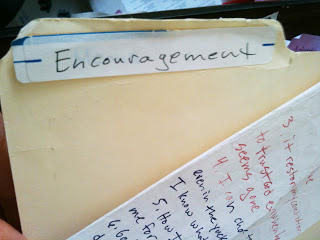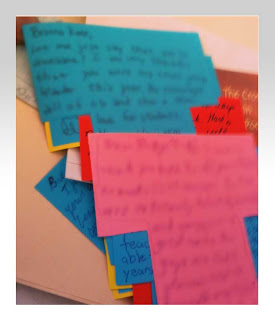This is a continuation of the last 2 Freedom Friday posts. It falls into the “Tools for the Journey” category, but it’s also a continuation of the discussion of Joshua (I recommend going back & reading this if you haven’t already).
We pick up the story in Joshua 4. The Israelites have just crossed the Jordan. They’ve seen God’s hand move powerfully and faithfully, as He continues to do what He has promised He would do.
Then God tells Joshua to have one man from each tribe go back into the middle of the river, take a stone from where the priests are standing, and carry it back out of the river.
4 So Joshua called together the twelve men he had chosen—one from each of the tribes of Israel. 5 He told them, “Go into the middle of the Jordan, in front of the Ark of the Lord your God. Each of you must pick up one stone and carry it out on your shoulder—twelve stones in all, one for each of the twelve tribes of Israel. 6 We will use these stones to build a memorial. In the future your children will ask you, ‘What do these stones mean?’ 7 Then you can tell them, ‘They remind us that the Jordan River stopped flowing when the Ark of the Lord’s Covenant went across.’ These stones will stand as a memorial among the people of Israel forever.”
I can’t help but wonder why God doesn’t tell them to get the stones on their way through the river. Is this again another little faith test, like when He commanded them to step into the Jordan, and only then would the waters part? While crossing the river, the Israelites were specifically instructed to stay a half mile away from the Ark of the Covenant, whereas now they are told to gather rocks from where the priests are standing. The stones needed to be from that very spot where the Ark of the Covenant, a sign of God’s presence and His promises, was held. God also instructed Joshua to make another pile of 12 stones in that very spot in the middle of the Jordan.
Notice they weren’t celebratory stones. It would have been a fine time to celebrate, but no. The “Stones of Remembrance” served as a memorial. A reminder of God’s faithfulness. That His promises were, and still are, true. The end of an era (slavery and wilderness wanderings), and a new beginning in the Promised Land.
The reality of life is that we all get discouraged. “Discouraged” is likely too weak of a word – “disheartened” is better. Proverbs says “Hope deferred makes the heart sick”. Our focus gets sidetracked by the wait. We forget all that God is, and all He has done in us & through us.
We get hyper-focused on our vision of how things should be. We even have a picture of how, when and why God will show up and come through.
The Israelites certainly had a preconceived idea of how God’s deliverance should look. Imagine the Israelites, enslaved for 400 years. For all those generations, they spent their days, while subject to the whims of Pharaoh, dreaming of how God would show up. In my article “Craving Egypt“, I wrote about how quickly the Israelites lost sight of all that God had done to deliver them from slavery in Egypt. The following words were spoken by the Israelites soon after the parting of the Red Sea.
“If only we had died by the Lord’s hand in Egypt! There we sat around pots of meat and ate all the food we wanted, but you have brought us out into this desert to starve this entire assembly to death.” Exodus 16:3
Even the Pharisees and Jewish leaders had an idea of what the Messiah, their deliverer, would look like. They had built in their minds an image of Him so inaccurate that when Jesus came, they didn’t even recognize Him.
The Stones of Remembrance after the crossing of the Jordan served not just as a reminder, but also as a warning. You will forget. You will lose sight. You will get off kilter, lose focus, sink into despair. You will even come up with your own ideas of what freedom looks like and how it should arrive.
It’s as if God is saying: I’ve carried you this far. Trust me. I’m not going to stop caring for you now. It may not look like you think it will. but I’m still here and I’m still working.
The Stones of Remembrance encourage us to focus on the “who” rather than the “how”. We love the “how”! We love imagining and conjuring up the grand scheme of how God is going to work in a particular situation. We’re not so enthusiastic about simply resting in the knowledge of who God is. We get too caught up in the details of the “how” to remember to fix our eyes on the eternal: Jesus.
This tool is different from the encouragement file in that the encouragement file is a place to keep reminders of thoughtful notes, affirmations, and thanks from people from over the years. Stones of Remembrance are times God came through, often in surprising ways.
So start writing it down. Look back through your journals, your emails, your Facebook status updates, and start a new journal. Write the date, and the way in which God came through. The manner in which He reminded you that He is good. The person through whom He spoke truth. The Scripture you heard three times in the same day, through three different means.
Write it down. You will forget. You will lose sight. We all do.
The Stones of Remembrance are what we reach for when we are disheartened, weighed down by the burden of the problems we were never meant to carry.
In the words of Sara Groves in her song by the same name, “He’s always been faithful; He will be again”.
That’s why we need Stones of Remembrance.
21 Then Joshua said to the Israelites, “In the future your children will ask, ‘What do these stones mean?’ 22 Then you can tell them, ‘This is where the Israelites crossed the Jordan on dry ground.’ 23 For the Lord your God dried up the river right before your eyes, and he kept it dry until you were all across, just as he did at the Red Sea when he dried it up until we had all crossed over. 24 He did this so all the nations of the earth might know that the Lord’s hand is powerful, and so you might fear the Lord your God forever.”









